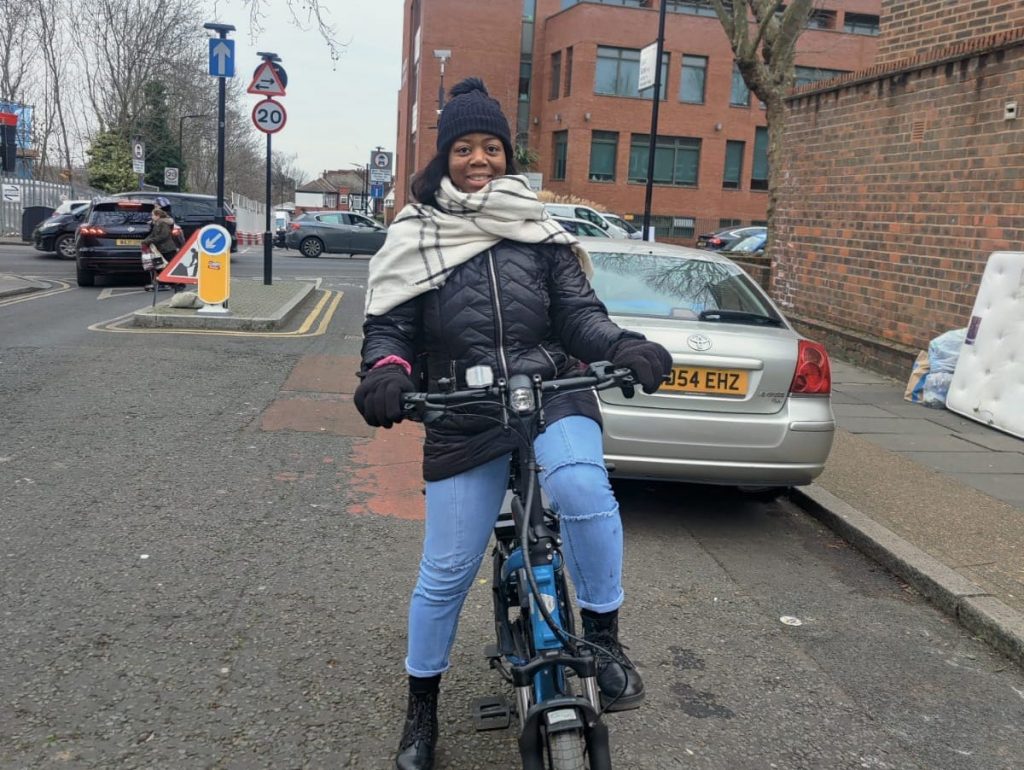- Funmi Shonibare, 28, of North London, lived car-free for a month this past January.
- She was a participant in the UK climate organization Possible's "Going Car Free Challenge."
- Shonibare says going car-free saved money, was "doable," and improved her well-being.
When 28-year-old Funmi Shonibare of North London first heard about the UK climate organization Possible's "Going Car Free" challenge last year, she happened to be looking for a new car to replace her vehicle of six years.
She called the search "so overwhelming." Not only was she unfamiliar with today's car market, she was surprised at how expensive everything was. Suffice to say, she was open to exploring alternatives.
In January, Shonibare became one of ten individuals to undergo a trial run of Possible's car-free challenge, an initiative intended to reduce car usage across the UK. She came away with three main takeaways: going car-free could save her money, improve her personal well-being, and crucially, the lifestyle was "doable."
"Initially, I thought, 'There's no way I can give up the car. There's no way,'" she says. "But if you really think about the journeys you're about to take, just ask yourself, 'Does it really need to be made by a car? Can you change it? Can you consider other options? Could you try to be a bit more sustainable?'"
After being selected for the trial, Shonibare worked with Possible to figure out the best car-free option for her, and they decided the bike was the best bet. Given Shonibare described herself as a "casual" cyclist, she says she was "a bit worried and scared" in the beginning to venture out onto the roads — particularly since her eight-year old daughter would often be accompanying her on a passenger bike.
To ease these concerns, she was provided three hours of cycling lessons, during which an instructor taught her not just how to cycle, but important safety procedures to follow. By the time this was over, Shonibare was ready to tackle the challenge at hand: not using her car for an entire month. She succeeded.
Shonibare is one of many Brits taking steps towards car-free — or "car-lite" lives. This month, Possible is running its official "Going Car Free" challenge across the UK, providing nearly 1,000 participants with received resources and encouraging them to meet milestones. Additionally, roughly 62% of people in inner London are already living car-free, per Car Free Megacities data. It's in outer London, however, where almost one-in-four said they feel "forced" to own a car in a February YouGov survey, where advocates face an uphill battle. Convincing people like Shonibare to try car-lite lives is essential to this progress.
'I did find myself feeling a bit better within myself'
Climate organizations like Possible are confident others can have similar success. Per the UK's 2020 National Travel Survey of over 6,000 individuals, 71% of trips were under five miles, and roughly 65% of trips between one to five miles were made by car. The relatively modest length of most trips make these organizations optimistic people can be persuaded to use other forms of transportation.
While Shonibare anticipated the environmental and cost savings benefits, she didn't anticipate the impact going car-free would have on her personal well-being.
"When I was on the challenge, I did find myself feeling a bit better within myself," she says, "because I was in society and I was out there. I wasn't just stuck in the car, hidden away. It did make that positive impact upon me."
The month was not without its difficulties, however. Some trips were easier than others, and there were times when her daughter preferred to be in a car.
"It is a challenge," she says of incorporating children into a car-free lifestyle, "but I think the most important thing is just keeping positive about the whole thing and making sure that they're having fun at the same time."
For others considering going car-free, a lack of access to reliable public transportation can create a formidable hurdle as well. This could soon become even a bigger issue for Londoners, as the government has announced plans to ax as many as 16 bus routes amid a series of budget cuts.
Moving forward, Shonibare plans to continue postponing her new car purchase as long as she can, as well as continuing to take steps towards a more car-free life. While she has access to public transportation, she prefers the flexibility of being on her own schedule — something she says biking provides her.
"I still see myself having a car," she says, "but just reducing the usage by quite a substantial amount and trying to do my bit — not just for the environment as much as it is important, but also for myself and my well-being and my daughter's well-being."
